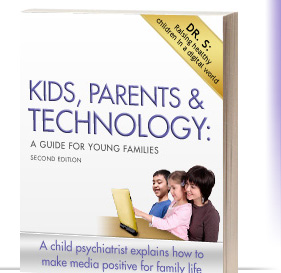Originally published by ThinkerMedia: BestThinking.com on September 21, 2015
Children need us to manage their experiences interacting with media. Parents need basic ideas to guide them.
All rights reserved.
More and more, recent press coverage is now exploring the new explosive trend in younger age groups consuming interactive media via touchscreens. “Is this trend a menace or boon?” is what people wonder, and the answer is usually a reasonable “Maybe a boon, but we need more research.” And there follow debates among experts.
This is hardly helpful. Parents cannot wait for the science to catch up because they urgently need an answer to “How do we effectively parent the touchscreen generation?”
– How’s a parent to compete with the iPad iPiper winning their kids away? Interactive touchscreens are so much more engaging than TV. And even people.
– Do we need to proactively manage this area of childhood, and is managing the same as policing? Managing means providing the best balance — and there are infinite resources via media.
– How do we frame the issues in a comprehensive, integrated manner that can empower parents and educators to manage interactive media rationally, beginning with preschool and extending through older youth? Parenting today requires active, proactive media management.
– How do we manage powerful sensory stimuli radiating from tablets and their successors that reach deeply into developing minds and brains and likely affect later personality, cognition, and civilized functioning?
– Even if they know what to do, how can technology empower parents with the tools they need?
Parents need a fresh way of thinking to make best media diet choices for their kids and families that factors in the fact that touchscreen tablets are powerful tools that alter emotions and behavior, and are not just toys. Such a fresh framework would lead a parent to react to the excellent brief video in the article above by noting that the woman is appropriately engaged and close to the child and waiting for the child to show more reciprocity, like eye contact, even though this moment probably shows a child engaged in learning with good attention.
Interacting with seductive machines can be a powerful organizer for social development and brain maturation, so is this kid missing out by not engaging more fully with the person? Can this child be affected significantly for the worse because of such a moment? Definitely yes, in my way of thinking — if it is a sample of a pervasive lifestyle feature for him that did not originate with a disorder. But this causal extreme is probably rare.
Nevertheless, a careful parent would have chosen content and would be ready with a well-considered plan for managing both limits and incentives to prevent excessive isolation. Unfortunately, there are now kids out there who have already spent too much of their childhood allowed to withdraw into the touchscreen for too long. A growing number is turning just four. It seems there could be a lot more, including many of yours. Count on it.
Actually, the answers to these are sensible, straightforward, and already right in front of us:
FIRST, we know already plenty about what’s good for kids and families. We already have a good systematic framework to understand childhood – let’s not ignore it. Let’s not reinvent it, but just apply it as a philosophy we can tailor to kids growing up today. As we learn more about how interactive tech changes us, we can be smarter, but for now let’s use what we already know.
Parents need to see the issues inherent in the kid-tech encounter more clearly against a backdrop of child development and brain maturation. They need to believe they can be effective. Then they need to adopt a sensible, systematic and rational system of thinking, much as they do for meal planning, not merely relying on antiquated rules or piecemeal advice. This is not the same as policing, but additionally calls for providing healthy, growth promoting content. Professionals can help parents by providing convenient “white lists” of vetted content in a technologically protected “sandbox”.
SECOND, parents need education to understand how the same reliable principles of parenting they already know can apply to new tech devices.
– One rule is supreme: Interactive technology belongs in children’s lives only if it is balanced in appropriate content and time spent with healthy activities and customized for each child’s needs. Parents must prevent excessive sedentary lone media consumption by youngsters and favor face to face time and physical play.
– Be ready to invest extra effort. Paradoxically, technology is not necessarily convenient, but adds to the challenges of parenting, and is not the ideal convenient babysitter so many parents relish. Keeping kids busy is not necessarily good parenting.
– Your own attitudes towards media may be obstacles to good example-setting. Parents may already be biased: The same candy-colored, magically engaging, sleekly enticing computing machines invented by our wonderful, most talented, brilliant cultural icons have admittedly already seduced many into a dependency. Awareness and self-monitoring and discipline are hard to maintain.
– Children need us to remember they are our children. Technology does not relieve us of our duty to kids. They need us to stay in control (or take it back) as we return to sound child rearing principles in all areas of their lives, including the massive area of media consumption. And the younger they are, the more they need our caregiving to focus in this area.
So is technology a menace or a boon? Yes. No. Maybe. Children still need their parents to clean up their world and to make available its best. We must also be alert to remain good role models in setting examples in our own tech consumption behaviors. Doing it right, through active systematic management, will allow us to embrace interactive technology’s power and make it a great boon to kids and family life, hands down.
Dr. Schwarz is a child psychiatrist author and inventor passionate about best use of media in families.
http://psychiatrists.psychologytoday.com/rms/178252?_ga=1.62766633.441222680.1393170801
Article by Eitan ‘Dr. S®’ Schwarz, MD
©All rights reserved



Principles for Parenting the Touchscreen Generation
Originally published by ThinkerMedia: BestThinking.com on September 21, 2015
Children need us to manage their experiences interacting with media. Parents need basic ideas to guide them.
All rights reserved.
More and more, recent press coverage is now exploring the new explosive trend in younger age groups consuming interactive media via touchscreens. “Is this trend a menace or boon?” is what people wonder, and the answer is usually a reasonable “Maybe a boon, but we need more research.” And there follow debates among experts.
This is hardly helpful. Parents cannot wait for the science to catch up because they urgently need an answer to “How do we effectively parent the touchscreen generation?”
– How’s a parent to compete with the iPad iPiper winning their kids away? Interactive touchscreens are so much more engaging than TV. And even people.
– Do we need to proactively manage this area of childhood, and is managing the same as policing? Managing means providing the best balance — and there are infinite resources via media.
– How do we frame the issues in a comprehensive, integrated manner that can empower parents and educators to manage interactive media rationally, beginning with preschool and extending through older youth? Parenting today requires active, proactive media management.
– How do we manage powerful sensory stimuli radiating from tablets and their successors that reach deeply into developing minds and brains and likely affect later personality, cognition, and civilized functioning?
– Even if they know what to do, how can technology empower parents with the tools they need?
Parents need a fresh way of thinking to make best media diet choices for their kids and families that factors in the fact that touchscreen tablets are powerful tools that alter emotions and behavior, and are not just toys. Such a fresh framework would lead a parent to react to the excellent brief video in the article above by noting that the woman is appropriately engaged and close to the child and waiting for the child to show more reciprocity, like eye contact, even though this moment probably shows a child engaged in learning with good attention.
Interacting with seductive machines can be a powerful organizer for social development and brain maturation, so is this kid missing out by not engaging more fully with the person? Can this child be affected significantly for the worse because of such a moment? Definitely yes, in my way of thinking — if it is a sample of a pervasive lifestyle feature for him that did not originate with a disorder. But this causal extreme is probably rare.
Nevertheless, a careful parent would have chosen content and would be ready with a well-considered plan for managing both limits and incentives to prevent excessive isolation. Unfortunately, there are now kids out there who have already spent too much of their childhood allowed to withdraw into the touchscreen for too long. A growing number is turning just four. It seems there could be a lot more, including many of yours. Count on it.
Actually, the answers to these are sensible, straightforward, and already right in front of us:
FIRST, we know already plenty about what’s good for kids and families. We already have a good systematic framework to understand childhood – let’s not ignore it. Let’s not reinvent it, but just apply it as a philosophy we can tailor to kids growing up today. As we learn more about how interactive tech changes us, we can be smarter, but for now let’s use what we already know.
Parents need to see the issues inherent in the kid-tech encounter more clearly against a backdrop of child development and brain maturation. They need to believe they can be effective. Then they need to adopt a sensible, systematic and rational system of thinking, much as they do for meal planning, not merely relying on antiquated rules or piecemeal advice. This is not the same as policing, but additionally calls for providing healthy, growth promoting content. Professionals can help parents by providing convenient “white lists” of vetted content in a technologically protected “sandbox”.
SECOND, parents need education to understand how the same reliable principles of parenting they already know can apply to new tech devices.
– One rule is supreme: Interactive technology belongs in children’s lives only if it is balanced in appropriate content and time spent with healthy activities and customized for each child’s needs. Parents must prevent excessive sedentary lone media consumption by youngsters and favor face to face time and physical play.
– Be ready to invest extra effort. Paradoxically, technology is not necessarily convenient, but adds to the challenges of parenting, and is not the ideal convenient babysitter so many parents relish. Keeping kids busy is not necessarily good parenting.
– Your own attitudes towards media may be obstacles to good example-setting. Parents may already be biased: The same candy-colored, magically engaging, sleekly enticing computing machines invented by our wonderful, most talented, brilliant cultural icons have admittedly already seduced many into a dependency. Awareness and self-monitoring and discipline are hard to maintain.
– Children need us to remember they are our children. Technology does not relieve us of our duty to kids. They need us to stay in control (or take it back) as we return to sound child rearing principles in all areas of their lives, including the massive area of media consumption. And the younger they are, the more they need our caregiving to focus in this area.
So is technology a menace or a boon? Yes. No. Maybe. Children still need their parents to clean up their world and to make available its best. We must also be alert to remain good role models in setting examples in our own tech consumption behaviors. Doing it right, through active systematic management, will allow us to embrace interactive technology’s power and make it a great boon to kids and family life, hands down.
Dr. Schwarz is a child psychiatrist author and inventor passionate about best use of media in families.
http:
Article by Eitan ‘Dr. S®’ Schwarz, MD
©All rights reserved